Paths to Dignity: Kalamazoo’s Junior Symphony premiers concerto for the unhoused
The Kalamazoo Junior Symphony Orchestra is world-premiering Paths to Dignity, a violin concerto for the unhoused by composer and Grammy-award winning conductor Lucas Richman and featuring well-regarded violinist Mitchell Newman on Sunday, Feb. 19.
Editor’s note: This story is part of Southwest Michigan Second Wave’s On the Ground Kalamazoo series.
“To be an artist is to believe in life.” – Henry Moore
A longtime musical friendship, a passion for working with the unhoused, and serendipity, have brought the world premiere of a violin concerto for the homeless to the music stands of Kalamazoo Junior Symphony Orchestra members as they prepare for its debut at 4 p.m. Sunday, February 19th at Chenery Auditorium.
Paths to Dignity, a concerto in four movements, was composed by Lucas Richman, conductor of the Bangor Symphony Orchestra in Maine, in part for his friend and violinist, Mitchell Newman, a former member of the highly-regarded L.A. Philharmonic and a passionate advocate for the unsheltered.
KJSO Conductor Andrew Koehler says he is thrilled for the Junior Symphony to be world-premiering Richman’s piece – both for its beauty and themes. Paths to Dignity, say both Richman and Koehler, is dedicated to the unhoused by sharing their stories – and to those who may or may not have those same experiences (both in the KJSO and the audience) to open their hearts to the issue through musical expression.
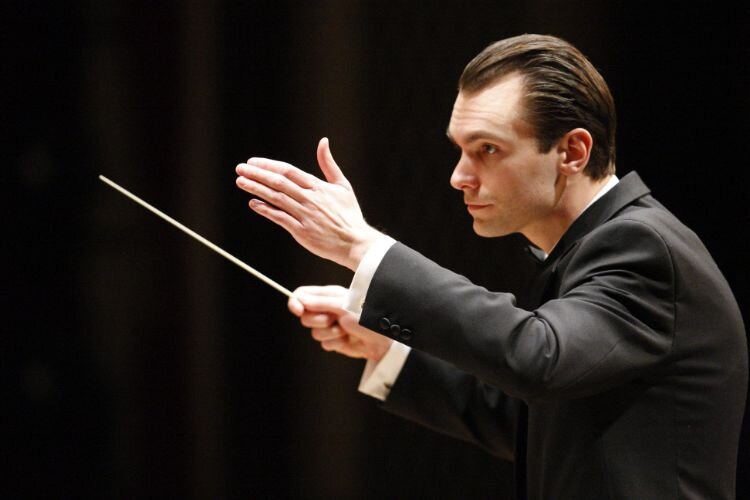
“This piece is trying to imagine the stories or potential stories of (the unhoused) that people have known or brushed up against, and in that, this music is for them,” says Koehler, who has been at the KJSO podium for the past 16 years, and also is a Associate Professor of Music at Kalamazoo College and conductor of the Kalamazoo Philharmonia.
“Music is at once very personal and very universal. That’s its great strength. It is kin for active radical empathy and helps us to try to connect to the people who have stories this piece might entail – and to encourage the people who may have no relationship to these stories to have a sense of the fears and hopes of what people in this situation might feel and kind of tap into that.”
Richman, a Grammy-award winning conductor who has performed many scores for film and television, including The Good Place and The Manchurian Candidate, and has had previous compositions performed by the Pittsburgh Symphony Orchestra and the San Diego Symphony, among others, is excited to premiere his concerto in Kalamazoo.
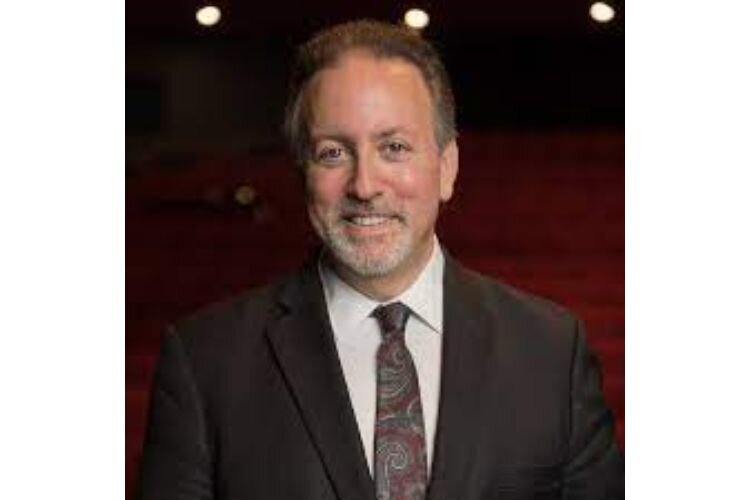
“The intention of this piece is that in every city in which it is presented, we are connecting the homeless advocacy groups with cultural organizations to forge a better understanding of an issue that is affecting communities across the United States,” says Richman.
“We’ve already found that the piece has inspired organizations and individuals on many different levels and it is so exciting to witness how each community is embracing the idea of this piece and how it in fact can help bring dignity to those who are in desperate situations all too often at no fault of their own.”
Music and community engagement
Collaborations are full of rich possibilities, and in Kalamazoo, musical collaborations happen frequently, but not as often with so many sectors of the service community as in this premier. Paths to Dignity is a musical partnership with the Stulberg International String Competition, whose founder, Julius Stulberg, was a beloved, longtime former conductor of the KJSO.
Two years ago during the height of the pandemic, violinist Newman was a judge of the prestigious local string competition, which was then virtual, and when asked by Richman where he might like to premier the piece, Kalamazoo came to mind. Megan Yankee, Stulberg Executive Director, then connected the composer and violinist with the KJSO.
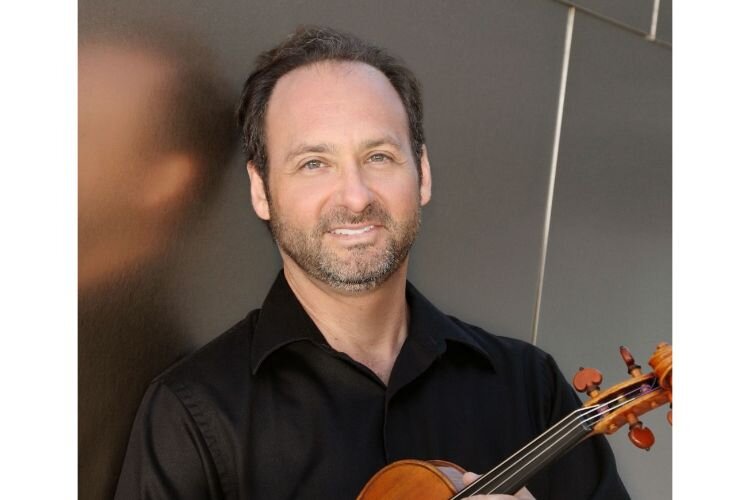
“Mitch and I are struck by the wholehearted embrace of this work that the Kalamazoo community has shown and we’re very, very grateful to the KJSO and Megan Yankee and Andrew Koehler for going on this leap of faith that we could manifest this project together,” says Richman.
Another key partner is Community Healing Center. Junior Symphony members, most of whom are in middle or high school, likely didn’t expect to be toting boxes of diapers to rehearsal along with their instrument cases when they auditioned. But they have been collecting and donating diapers for Community Healing Center during the entire rehearsal cycle. Donations of diapers and other requested items (see the list below) will also be accepted on the day of the concert.
In Newman’s and Richman’s packed weeklong residency in Kalamazoo, the KJSO chamber groups will be performing with Newman at the Gilmore Inpatient Rehabilitation Center, ChC Youth Programs S.T.R.E.E.T. (Survival, Trust, Resources, Education, Empowerment, They), and Niñas del Corazón (Girls of the Heart)
“We certainly have had concerts that have touched on social themes before,” says Koehler. “Our quartets have always played in the community in various ways. But this has been such a wonderful invitation to rethink what that looks like and deepen our commitment to an even broader swath of the community.”
He adds, “This is part of a more sustained effort. Our chamber groups can continue visiting spaces like the ones they have been visiting this year. They are flexible, and modular, and they can go out and share their music in these communities well into the future, well past this week.”
It’s been over 34 years since the KJSO last performed a commissioned piece.
“The last time we did a commission was for our 50th,” says longtime KJSO Executive Director Lee Fletcher. “We have a contribution to make to this community that supports us, too. I am thrilled.”
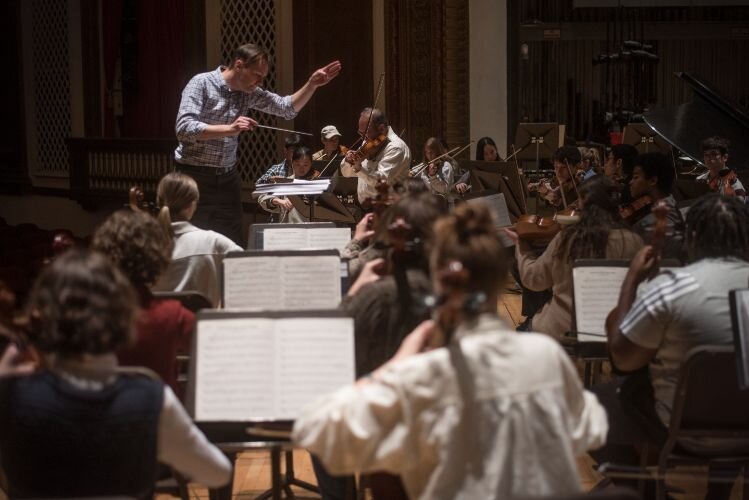
These types of events, though well-partnered, still entail raising funds to support the visiting musicians and underwriting the commission. “Lee did all the fundraising,” says Koehler. “She was great. She said she would find a way to make it happen and she did.”
“From a musical perspective, it’s been a really exciting collaboration,” says Koehler. “Just on the face of it, it’s thrilling to be able to do a brand new piece of music. The process of bringing this into the world and getting to do it with a soloist who is not only a great musician and teacher in his own right but also cares deeply about the issue of homelessness makes it even more exciting.”
Origin story
The concerto came about as a result of Richman’s friendship with Newman, for whom he’s written the piece. Richman said to Newman, “I don’t know if the world needs another violin concerto, but if I were to write one, what would you want it to be about? Immediately Mitch said homelessness. I said, of course.”
As a violinist with the L.A. Phil, Newman was extremely active in bringing music to the unsheltered in Los Angeles, both through P.A.T.H. (People Assisting the Homeless) and the highly-regarded Street Symphony, a nonprofit that “utilizes music to create opportunities of human connection to homeless and incarcerated communities through workshops, events, and one-on-one musical instruction,” according to Street’s website. The organization is very active on Skid Row, in homeless shelters, and in LA County jails.
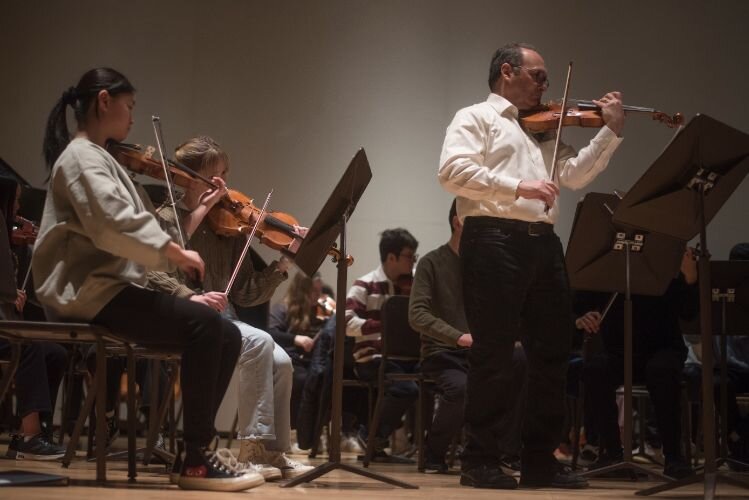
“That began our journey with this piece,” says Richman. “From the very beginning it was not just about my writing this piece of music, but equally important in the presentation of the piece is the community engagement aspect. I didn’t want to write a piece about homelessness that played for rich patrons who would listen and say, ‘Aw, isn’t that just terrible,’ then ignore the people living on the sidewalk as they walked to their cars after their performance.
“Sadly, of course, this issue exists in every community around the country so we do hope that we will be able to bring the piece to every state and in so doing help forge those very important relationships and bring solace and comfort to those in need.”
Paths to Dignity: Four Movements
The third and fourth movements have been performed in Raleigh, North Carolina in November, but this is the first time the entire four movements have been performed together which makes it the world premiere, says Richman.
Thematically, each movement reflects issues and stories related to the unhoused. “The first three movements are more about the individual stories of people of the unhoused,” says Richman. The last movement is about healing and integration. Below are the themes of each movement in Richman’s own words.
First Movement: Our Stories
“Each member of the orchestra has a five-note motif, This is my story, the violinist responds musically, I hear you. I see you.”
Second Movement: Fever Dreams/Move
“The first half (of this movement) is about PTSD and the effects of trauma experiences by veterans who make up a big population of the homeless. And the second half (of the movement) is about something the unsheltered often hear: move, get out of the way, leave, find someplace else to go.”
Third Movement: Shelter for my Child
“This movement is the focal point of the piece in that it is based on the Hebrew word, tzedek, which means justice. That word is expanded to tzedekah which is charity in the Jewish tradition. The community must make sure everyone in the community has food and shelter. So there’s a musical motif that reflects tzedek, a motive which captures the innocence of a child and the nurturing mother as they face the issues on the street.”
Fourth Movement: Finding Home
“The fourth movement brings the piece into focus with the idea of pointing towards reintegration into society. The violinist leads the community in a rallying set of variations on the word dignity.”
The changing face of the KJSO
In the last decade, the KJSO, in part through the supportive educational arm of the Kalamazoo Symphony Orchestra’s Kids in Tune program that musically trains at-risk youth, has an increasing diversification of its student membership in terms of race, ethnicity, and socioeconomic status, which has been a longtime KJSO goal, says Fletcher.
Fletcher, who has been at the helm for 38 years, plans to retire in May. The new Executive Director will be announced in the spring,
“The Junior Symphony right now has students who come from a lot of different walks of life. Some may feel closer to this experience because they have had brushes with it themselves and there are some who it is totally outside of their experience,” says Koehler.
“They are all a part of the Junior Symphony family. I hope what that means is that the people who have no experience with (homelessness) are asked to think and empathize and understand what is there, that they realize that this is an issue in the community and this is something that affects people. They are contributing their artistry, and maybe it will also encourage them to go beyond that and do more.
“Also, for those students who may have been closer to that experience, this helps them feel even more welcome and included. I hope this helps them feel more seen and even ever more welcomed into a space (the classical music world) that sometimes isn’t historically known for being welcoming. We’re hoping to keep chipping away at that problem of perception.”
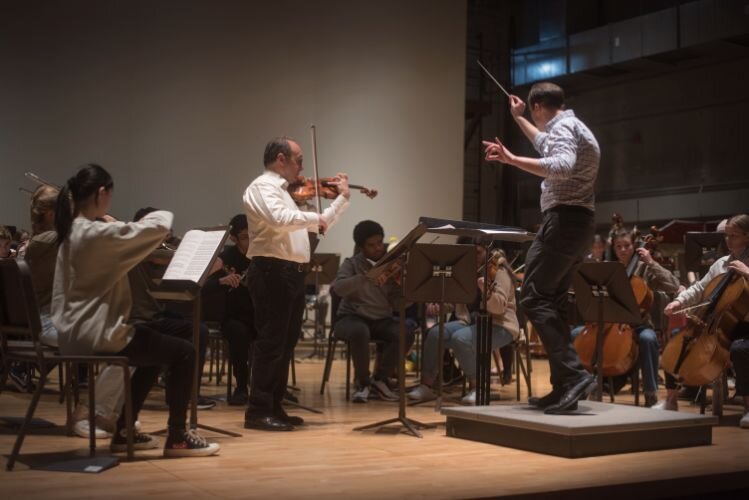
Richman, who says he sees a special import in a youth orchestra premiere, concurs. “Too often, our classical music presentations are not considered to be anything but entertainment, and yet we have the opportunity as performing artists to be of service to our community in many different ways beyond just entertainment.
“Doing so brings an important relevance to our craft. So having the Kalamazoo Junior Symphony play this brings an immediacy to the fact of doing service to one’s community,” says Richman.
“And I know that there very well may be people in the KJSO who are affected by this issue personally so the idea of making this music and giving this gift to the community is something that I hope stays with these young musicians so they can understand how powerful their gift can be.”
In its partnership with Community Healing Centers, the KJSO welcomes donations of money and the following at the concert: diapers (particularly sizes 4-6 and overnight pull-ups for older children); baby wipes; warm clothing, such as hats, gloves, socks and gently-used winter coats; alcohol-free hygiene products (no aerosols please); deodorant, toothpaste, lotions, mouthwash and razors.
Tickets for Sunday’s concert are available at the door for $5 for students, $10 for seniors, and $15 for other adults. They are also available at kjso.org. Members of the participating community service organizations for this project are invited to attend free of charge.















